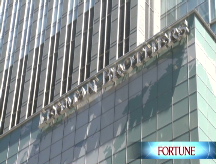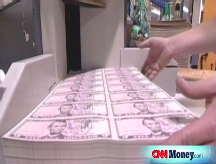Stocks knocked by bank woes
Wall Street sinks amid renewed concern about Fannie Mae and Freddie Mac and the dollar's drop against other major currencies.

NEW YORK (CNNMoney.com) -- Stocks tumbled Monday, as Fannie Mae and Freddie Mac plunged, amid renewed concerns about the financial sector and a weaker dollar.
The Dow Jones industrial average (INDU) lost about 180 points, or 1.6%. The broader Standard & Poor's 500 (SPX) index lost 1.5% and the Nasdaq composite (COMP) lost 1.4%.
Stocks had been under pressure throughout the session as the dollar slid and oil prices fluctuated amid worries about a tropical storm approaching the Gulf Coast. But the stock selloff accelerated in the afternoon, led by the financial sector.
Fannie Mae (FNM, Fortune 500) and Freddie Mac (FRE, Fortune 500) tumbled after financial weekly Barron's suggested the mortgage finance firms won't be able to raise the capital they need and that a government takeover is inevitable. In addition, Freddie Mac's debt sale drew lackluster demand on Monday. Fannie shares hit a more than 20-year low and Freddie shares hit a more than 17-year low.
"They didn't really say anything that new, but they kind of reminded us that we're not out of the woods yet on the financial sector," said Art Hogan, chief market analyst at Jefferies & Co.
Additionally, Lehman Brothers could end up reporting a big third-quarter loss, rather than the currently expected profit, the Wall Street Journal reported Monday. Lehman (LEH, Fortune 500) shares lost 7%.
Other financial stocks tumbled too, including Dow financial components' AIG (AIG, Fortune 500), American Express (AXP, Fortune 500), Bank of America (BAC, Fortune 500), Citigroup (C, Fortune 500) and JP Morgan Chase (JPM, Fortune 500).
For the last two weeks without much interruption, investors have had a sell-energy-stocks-and-buy-financial-stocks pattern, Hogan said.
But he said that trade, at least on Monday, has hit a plateau or come to a screeching halt.
Stocks were mostly upbeat last week, boosted by falling oil prices and a rallying dollar. That trend of weaker commodities, stronger greenback is likely to continue through the rest of the summer, Hogan said.
However, broad stock market day-to-day moves should be taken with a grain of salt, in that trading volumes are very low as is typical in late summer, he said.
In another troubling sign for the housing market, an industry report showed that homebuilders' confidence held at a record low in August for the second month in a row. (Full story).
Tuesday brings reports on wholesale inflation and housing starts and building permits. Earnings from Target (TGT, Fortune 500) and Home Depot (HD, Fortune 500) are also due.
Fuel prices: U.S. light crude oil for September delivery fell 90 cents to settle at $112.87 a barrel on the New York Mercantile Exchange, a 3-1/2 month low. Prices were volatile during the session as Tropical Storm Fay approached Florida.
Retail gas prices dropped overnight, extending a downward trend for a 32nd day, according to a survey of gas station credit-card activity. (Full story.)
On the move: Big Dow losers included General Motors (GM, Fortune 500), Hewlett-Packard (HPQ, Fortune 500) and Home Depot (HD, Fortune 500). All 30 Dow components fell.
Lowe's, the home improvement retailer, posted a drop in quarterly profit that was not as big as had been expected. The company also issued a cautious outlook. However, Lowe's (LOW, Fortune 500) shares were little changed.
BHP Billiton (BHP) posted a record full-year profit and issued an upbeat outlook. Shares of the miner ended little changed
On the upside, Ambac Financial (ABK) and MBIA (MBI) bucked the downward trend for financials, gaining for a second session. On Friday, Standard & Poor's took the companies' bond insurance arms off negative watch and affirmed their AA ratings. They remain on "negative outlook."
Market breadth was negative. On the New York Stock Exchange, losers topped winners by eleven to five on volume of 985 million shares. On the Nasdaq, decliners edged advancers by two to one as 1.68 billion shares changed hands.
Deals: Japanese bank Mitsubishi UFJ Financial Group will buy the 35% of California bank UnionBanCal it doesn't already own for $73.50 per share, or around $3.5 billion. UnionBanCal (UB) turned down a $63 per-share offer last week. UnionBanCal shares gained nearly 12%.
Other markets: In the bond market, Treasury prices rose, lowering the yield on the benchmark 10-year note to 3.81% from 3.84% late Friday.
In currency trading, the dollar fell against the euro and the yen.
COMEX gold for October delivery rose $13.40 to $801.80 an ounce. ![]()




